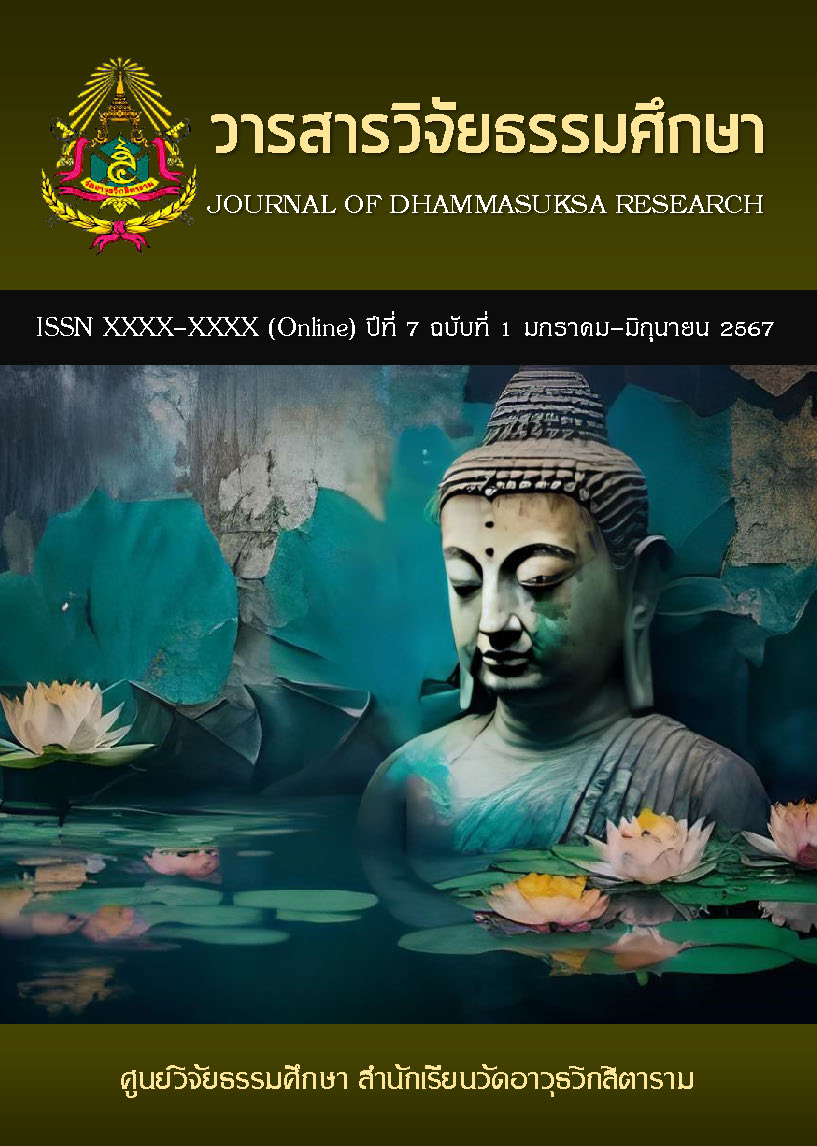FACTORS OF ADMINISTRATOR’S RESLIENCE LEADERSHIP AFFECTNG TEACHERS’ JOB SATISFACTION IN INNER MONGOLIA UNIVERSITY FOR NATIONALITIES IN TONG LIAO CITY, INNER MONGOLIA
คำสำคัญ:
resilient leadership, teacher job satisfaction, Inner Mongolia University for Nationalitiesบทคัดย่อ
The objectives of this study were: (1) To explore the compents and indicators of administrators' leadership and teachers' job satisfaction; (2) To study the factors of administrators' leadership affecting teachers' job satisfaction in Tongliao City University of Nationalities, Inner Mongolia; (3) To propose the guidelines for improving the leadership of administrators at Tongliao University for Nationalities in Inner Mongolia.
The study utilized a mixed-method approach combining quantitative and qualitative research. The population of thesis research consisted of 2037 teachers of Inner Mongolia University for Nationalities, Totaling 330 samples. The key informants were five administrators drawn from Inner Mongolia University for Nationalities and from the institutions through purposive sampling method. The experts for the focus group discussions consisted of five experts. Data collection instruments included a five-point scale questionnaire and a validity and reliability checklist. Statistics used for data analysis included frequency, percentage, mean, standard deviation, (EFA) exploratory Factor Analysis and confirmatory factor analysis. Both in-depth interviews and focus group discussions were analyzed using content analysis.
The results of the revealed showed : 1.There factors of resilient leadership 1) mental toughness, 2) emotional toughness, 3) social toughness, and 4) moral humanity, as well as 15 components, 1) Occupational Mental Toughness 2) Work Environment and Facilities, 3) Salary and Benefits, 4) Career Development Opportunities 5) Student Relations and Teaching Experiences, and 15 Components of teacher job satisfaction. 2. The four influencing factors of resilient leadership have an impact on teachers' job satisfaction at Inner Mongolia University for Nationalities factors leading. 3. 15 guidelines for leadership improvement and teacher satisfaction at Inner Mongolia University for Nationalities are proposed. Through the policy implementation of resilient leadership, the vision of the leadership function of Inner Mongolia University for Nationalities will be realized to lead the development of higher education, to promote the administrative function of higher education and to improve the viability of each university.
เอกสารอ้างอิง
Abbas, G, Iqbal, J., Waheed, A., & Naveed Riaz, M. (2012). Relationship between transformational leadership style and innovative work behavior in educational institutions. Journal of Behavioural Sciences, 22(3).
Aboramadan, M., & Kundi, Y. M. (2020). Does Transformational Leadership Better Predict Work-Related Outcomes Than Transactional Leadership in the NPO Context Evidence from Italy. Voluntas, 31(6), 1254–1267. https://doi.org/10.1007/s11266-020-00278-7
Akhmedova, M. T., Narmetova, Y. K., Nurmatova, I. T., & Malikova, D. U. K. (2022). Communicative Competence Formation in Future Teachers Based on an Integrated Approach. International Journal of Multicultural and Multireligious Understanding, 9(4), 54–60.
Ali, N., Ali, S., Ahsan, A., Rahman, W., & Jan Kakakhel, S. (2014). Effects of leadership styles on job satisfaction, organizational citizenship behavior, commitment and turnover intention (empirical study of private sector schools’ teachers). Life Science Journal, 11(4), 175–183.
Anderson, M. (2017). Transformational leadership in education: A review of existing literature. International Social Science Review, 93(1), 1–13.
Asghar, S., & Oino, D. (2017). Leadership styles and job satisfaction. Asghar, S., & Oino, I.(2018). Leadership Styles and Job Satisfaction, Market Forces, 13(1), 1–13.
Aziri, B. (2011). Job satisfaction: a literature review. Management Research & Practice, 3(4).
Barnes, R. W., Grove, J. W., & Burns, N. H. (2003). Experimental assessment of factors affecting transfer length. Structural Journal, 100(6), 740–748.
Bass, B. M. (1985). Leadership: Good, better, best. Organizational Dynamics, 13(3), 26–40.
Bass, B. M., & Avolio, B. J. (1993). Transformational leadership and organizational culture. Public Administration Quarterly, 112–121.
Bass, B. M., Avolio, B. J., Jung, D. I., & Berson, Y. (2003). Predicting unit performance by assessing transformational and transactional leadership. Journal of Applied Psychology, 88(2), 207.
Bishay, A. (1996). Teacher motivation and job satisfaction: A study employing the experience sampling method. Journal of Undergraduate Sciences, 3(3), 147–155.
ไฟล์ประกอบ
เผยแพร่แล้ว
รูปแบบการอ้างอิง
ฉบับ
ประเภทบทความ
หมวดหมู่
สัญญาอนุญาต
ลิขสิทธิ์ (c) 2024 วารสารวิจัยธรรมศึกษา

อนุญาตภายใต้เงื่อนไข Creative Commons Attribution-NonCommercial-NoDerivatives 4.0 International License.



